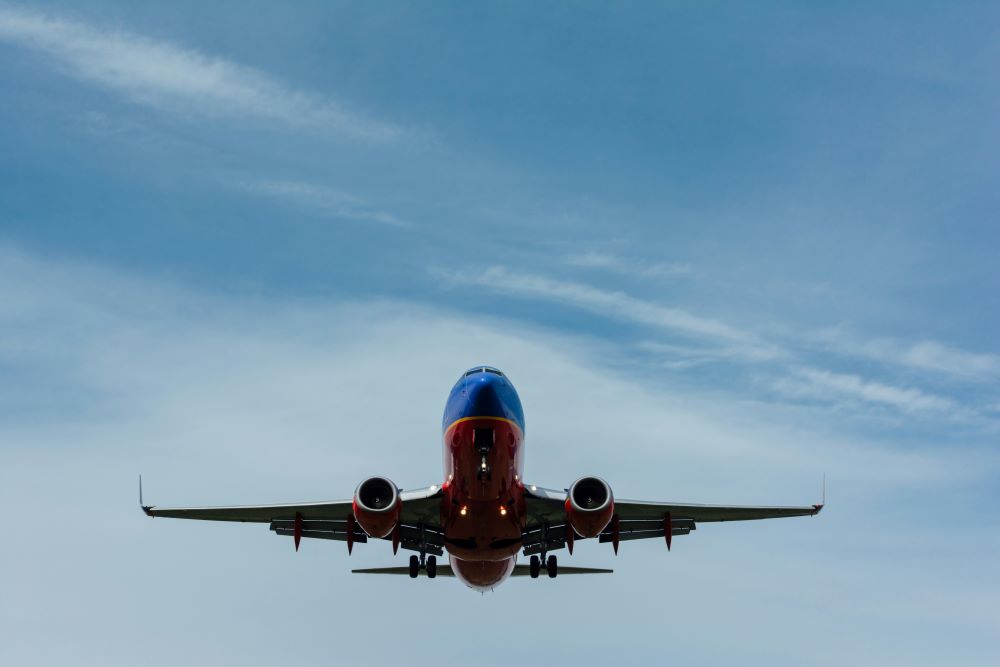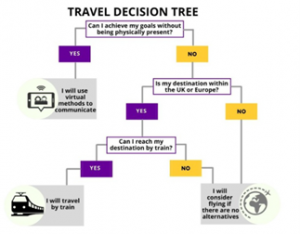
Insights into Air Travel Policy with Professor Holly Shiels
Air travel contributes approximately 4% to the rise in global temperatures and is projected to cause a 0.1 °C increase in global warming by 2050. With the consequences of the climate crisis intensifying across the world, it is crucial that institutions like universities, whose commitment to international collaboration and research often entails significant air travel, take decisive action to mitigate their carbon footprint.
Highlighted as a key action within ‘Our Sustainable Future’ strategic plan, the University is committed to implementing sustainable travel initiatives both locally, nationally and globally. To achieve our target of limiting annual air travel emissions to 50% of our 2018/19 levels, the University’s travel policy outlines requirements and supporting guidance to help our community assess essential travel against environmental cost.
The University’s travel policy
The policy ensures that any international travel is essential, with travellers expected to thoroughly consider alternatives, such as video conferencing in the first instance. The proposed trip must align with the University’s academic and business strategies and the anticipated outcomes/benefits proportionate to the environmental cost and associated expenses. Several resources are available to assist travellers in decision making, such as the University’s travel decision tree (below) and the Air Travel Justification Tool.

If travel is deemed unavoidable, the most carbon-efficient option should be prioritized, even if not the cheapest. To cover any additional expenses incurred by opting for sustainable travel, the University offers a top-up fund.
Where commercial travel is the only practical route, travellers must fly economy class as opposed to business class as the latter incurs 4 times the environmental cost due to the extra space and resources required per individual.
Insights into air travel with Professor Holly Shiels, Director of Internationalisation, SMS
 As a university that is committed to building relationships with global partners to tackle the world’s most pressing challenges, balancing travel needs with sustainability is of utmost importance. To gather insights into how the University’s travel policy is implemented in practice and the challenges involved, we spoke to Professor Holly Shiels, Director of Internationalisation in the School of Medical Sciences.
As a university that is committed to building relationships with global partners to tackle the world’s most pressing challenges, balancing travel needs with sustainability is of utmost importance. To gather insights into how the University’s travel policy is implemented in practice and the challenges involved, we spoke to Professor Holly Shiels, Director of Internationalisation in the School of Medical Sciences.
Primarily overseeing the University’s partnerships with institutions in North and South America, Holly works collaboratively alongside her counterparts in SBS, SHS and Professor Keith Brennan, Vice Dean for Internationalisation, to develop and implement strategic initiatives that enhance global engagement, promote academic exchange, and foster research and teaching collaborations.
Due to the nature of their work, in-person engagement is often critical in establishing new collaborations, particularly in certain cultures where face-to-face interaction is essential for building trust. Interestingly, in certain regions, there is an added need to send a sizable delegation to demonstrate commitment and buy in from important stakeholders, as well as a sign of cultural respect. To overcome these challenges in alignment with the University’s sustainability goals, Holly emphasised the importance of carefully considering the trip’s purpose and intended outcomes. This approach ensures that all travel decisions are necessary, focused solely on achieving the trip’s objectives, whilst minimizing environmental impact.
To maximise the efficiency of their travel and reduce carbon emissions, the internationalisation team has adopted several strategies. This includes combining multiple objectives within a single trip. The team often schedules meetings with various universities and stakeholders across the visiting country, reducing the need for separate trips. When travelling across the country or to European destinations, train travel is always prioritised where feasible. If layover flights are necessary, the team will attempt to coordinate meetings with partners across touchdown sites so long as it aligns with the travel route and university objectives.
The team also frequently coordinates travel with other university activities, doubling the purpose of the trip and reducing overall emissions. For instance, if an academic is already traveling for internationalisation purposes, they may also be tasked with visiting placement students or representing the University at careers fairs.
Speaking on the power and accessibility of virtual platforms, Holly described how the team are increasingly looking for new ways to harness their benefits for collaboration. For instance, they are planning to set up virtual climate cafes and meet-and-greet seminars between students and academics in Manchester and their counterparts in the University of Chile. These online interactions will aim to build relationships, allow students to hear global perspectives and co-produce academic programs that address global challenges.
Looking ahead, Holly acknowledges that as the University expands its global presence, the challenge of balancing travel needs with sustainability will only grow. Ongoing reflections, on a personal and professional level, and the development of a stringent criteria for internationalisation, will be vital in balancing our global presence with the need to reduce our environmental impact.
References
(1) M Klöwer et al, 2021. Quantifying aviation’s contribution to global warming. Environmental Research Letters, 16, 104027.

0 Comments